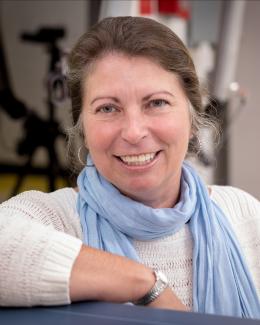Julie Ezold knows ORNL is continuously making great strides in producing and processing radioisotopes.
As head of ISED’s Radioisotope Production and Operations Section, she wants to make sure the rest of the world knows it, too.
“I want to work on getting the word out, on really promoting the cool stuff we do,” Ezold said. “We sometimes get so bogged down in filling orders and meeting customers’ needs, we forget to toot our own horns. I want to see staff go to conferences and present their work.”
Ezold’s own proudest accomplishment to date—being part of the team that discovered a new element, Tennessine—garnered international attention.
But her “baby”—incubated during her pregnancy with her own daughter—was the revival of the californium-252 program. In 2008, the program’s sponsor decided to cease producing the isotope, to the dismay of industry customers. The Department of Energy then decided to move the Isotope Program to its Office of Science.
“I was put in charge of the californium-252 program when it was dying,” Ezold said. “I was on the ground floor and got to help put it all together: the contract, the cost, what it takes to make californium. I had the opportunity to set up how we were going to do the program.”
ORNL is the sole U.S. producer of the neutron-emitting isotope, made by neutron irradiation of curium in the lab’s High Flux Isotope Reactor, and it was the first isotope industry contracted DOE to make.
“It was a lot of work,” Ezold said—but the program paved the way for other isotope contracts with industry, such as actinium-227 and americium-241.
A nuclear engineer who’s been with the lab for 29 years, Ezold didn’t start in isotopes. She began her career with engineering products related to waste management and environmental restoration. When funding for that program ended, she trained to be a safety engineer for the Y-12 National Security Complex, where she spent eight years as a criticality safety officer and shift technical adviser for enriched uranium operations.
Next, Ezold spent three years doing independent oversight, giving her an overview of the methods of then-new contractor UT-Battelle as well as an intimate understanding of the operations at ORNL’s Radiochemical Engineering Development Center. That gave her the desire to work in nuclear science. A year later, she took the helm of the californium-252 program. She became section head for Radioisotope Production and Operations last fall during the Reimagining ORNL initiative.
“I worked both sides—operation, and customer service—so I can see things from different perspectives,” she said. “That greatly helps you know to ask the right question and really listen. We’re all so busy, it’s sometimes hard to listen and really hear.”
As section head, Ezold wants to offer staffers the chance to experience different aspects of the programs.
“Some people are happy just doing one thing their entire career, but others do want to be rotated and have that opportunity to see things from another perspective,” Ezold said. “It helps them see that big picture—that it’s not just the production of the isotope itself, but understanding the scheduling and the budget and the impact if we’re successful. There’s a big picture to the Isotope Program, and ORNL has a major role in that.”
Ezold said she’s fortunate to have experienced a variety of management techniques, which informs how she relates to her own section employees now.
“Some of the managers I’ve done best with, and now try to emulate, were very transparent,” she said. “You knew where you stood with them. They let you know their expectations, and when you performed, you were recognized. And when you made a mistake, you were quietly taken into the office, where you discussed why it happened and what you learned from it and what you would do differently, and then it was done. It wasn’t dwelled upon. We moved forward.”
“I appreciate that. We all are going to make mistakes. The key is, what did you learn from it, and what would you do differently?”
When not working, Ezold devotes her time to her daughter, now 12, and her pets. Among their favorite escapes is hiking and immersing themselves in nature.
“Tennessee has amazing state parks,” Ezold said. “Give me a cabin in the woods, and I’m good.”
UT-Battelle manages ORNL for the Department of Energy’s Office of Science, the single largest supporter of basic research in the physical sciences in the United States. The Office of Science is working to address some of the most pressing challenges of our time. For more information, please visit energy.gov/science.





